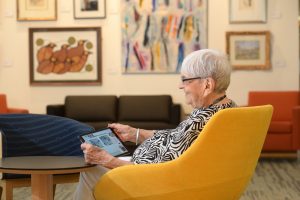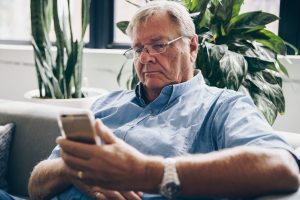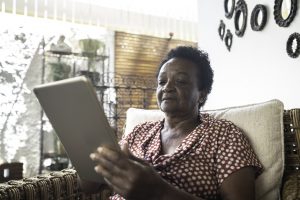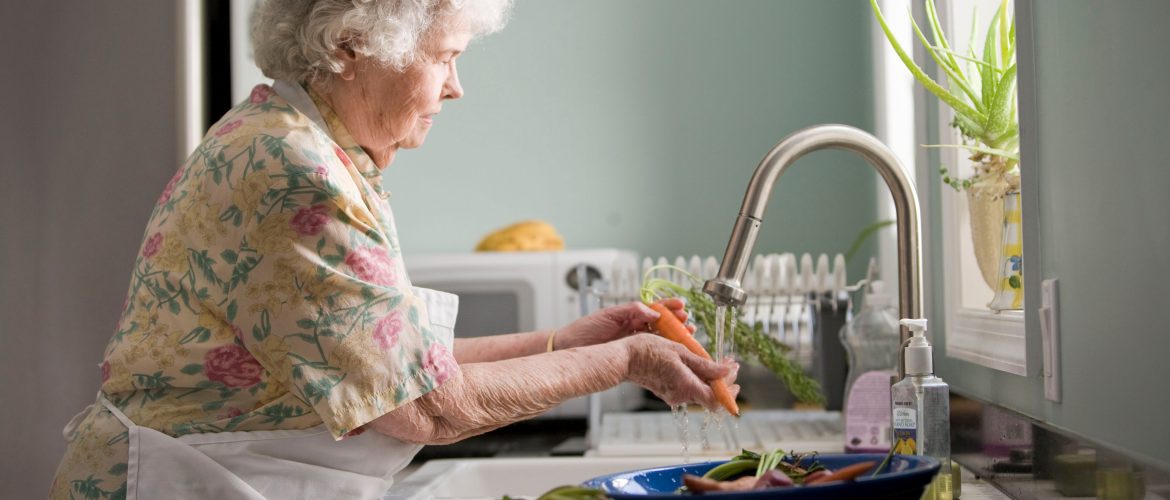In light of the current public-health emergency caused by COVID-19, CABHI will be releasing a series of blogs about the aging and brain health solutions aimed at promoting the physical, cognitive and social well-being of seniors and their caregivers.
While health and safety protocols, such as self-isolation and physical distancing, are critical to slowing the spread of COVID-19, they could also place older adults at an even greater risk of experiencing social isolation. Self-isolation and physical distancing[i] have resulted in a loss of access to community and recreational activities such as theaters, libraries, and museums[ii] – activities that can help maintain the cognitive, social, and physical well-being of seniors.
The Centre for Aging + Brain Health Innovation (CABHI), powered by Baycrest, is committed to finding and accelerating solutions that improve the quality of life for seniors as they age. Many of these solutions provide examples for how technology and innovation can keep seniors culturally engaged and connected to a vibrant network of family and friends, as well as caregivers, while reducing their risk of exposure to viruses like COVID-19.
Read more about the solutions being offered through CABHI and other organizations that are aimed at addressing social isolation among seniors:
1. The Virtual Art Gallery

ArtOnTheBrain
ArtontheBrain is an affordable online recreation activity designed for all older adults, including those with cognitive decline. The app presents visual art in an interactive online environment through a series of enjoyable learning tools. ArtontheBrain offers older adults a way to stay informed and connected while maintaining their social and cognitive health. Powered by Baycrest and supported by CABHI, this scientifically validated intervention also helps to build the relationship between older adults and their circle of care through a virtual platform. The app is easy to use and can be accessed and enjoyed anytime.
2. Friendly Neighbour Hotline
University Health Network’s OpenLab is helping seniors—the group most at risk during the COVID- 19 pandemic—by mobilizing volunteers to deliver groceries and other household essentials to their homes. Seniors living in Toronto can call the Friendly Neighbour Hotline to be connected with a network of volunteers throughout the city who can help with picking up groceries and household essentials during this difficult time. The service gives priority to seniors living in low-income housing and is available in 180 languages.
To learn more about the Friendly Neighbour Hotline visit uhnopenlab.ca/project/hotline
3. Live at the Metropolitan Opera
As a result of the COVID-19 pandemic, the Metropolitan Opera has had to cancel all of its live performances. Yet – as they say in show business – the show must go on! All encore presentations from the company’s Live in HD series will now be available for free on-demand streaming with each performance available for a period of 23 hours beginning at 7:30pm EDT. The streams are also available through the Met Opera on Demand apps for Apple, Amazon, and Roku devices, and Samsung Smart TV.
Visit the metopera.org to access this free on-demand service.
4. Seniors’ Centre Without Walls
Through the use of conference call technology, Seniors’ Centre Without Walls (SCWW) provides the  opportunity for seniors to obtain pertinent health-related information and social connections through direct access and conversations with peers and professionals from their community. This solution, supported through CABHI’s Spark program, allows seniors to stay connected from home and also increase later-life learning opportunities, participation in brain-stimulating activities, and most importantly, community building and an opportunity to create new and meaningful friendships. Connecting with this technology will not only decrease social isolation for older adults, it will also increase cognitive health and the ability to age in place.
opportunity for seniors to obtain pertinent health-related information and social connections through direct access and conversations with peers and professionals from their community. This solution, supported through CABHI’s Spark program, allows seniors to stay connected from home and also increase later-life learning opportunities, participation in brain-stimulating activities, and most importantly, community building and an opportunity to create new and meaningful friendships. Connecting with this technology will not only decrease social isolation for older adults, it will also increase cognitive health and the ability to age in place.
Visit Timiskaminghu.com to learn more about this program.
5. Online Memory Library

Through support from CABHI’s Spark program, COMPAs – an evidence-based app – is being used to support person-centred communication between people living with dementia, their family members, and caregivers. The requirement to self-isolate during the COVID-19 pandemic will prevent many family members from visiting their loved ones who are living with dementia in long-term care facilities. With tools like COMPAs, family members can continue to connect with their loved ones while keeping them happy and safe. COMPAs can spark positive communication and improve well-being in people living with dementia by connecting them to photographs, videos, and songs that may have marked a key moment in their personal life. COMPAs’ interface is simple and intuitive, and its content is fully customizable to reflect relevant life events.
Learn more about how CABHI is responding to the COVID-19 pandemic.
[i] https://www.ontario.ca/page/2019-novel-coronavirus#section-10
[ii] https://www.cbc.ca/news/canada/toronto/covid-19-coronavirus-ontario-monday-1.5506445


